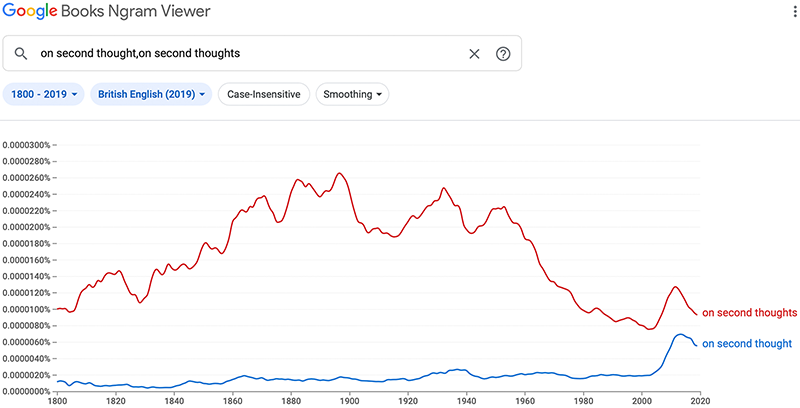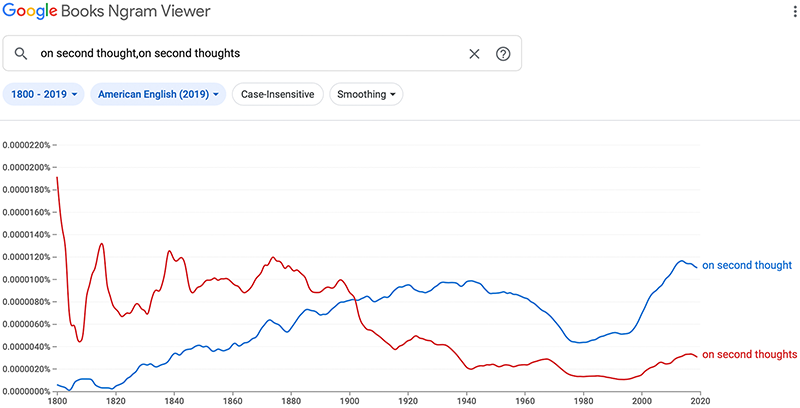

| Archive Blog Cast Forum RSS Books! Poll Results About Search Fan Art Podcast More Stuff Random |
|
Classic comic reruns every day
|
1 Terry: How are we going to get Steve out of custody?
2 Jane Goodall: We could just leave him there.
3 Terry: But then he’ll miss being blasted into outer space on Elon’s rocket!
4 Jane Goodall: On second thoughts...
|
First (1) | Previous (4669) | Next (4671) || Latest Rerun (2895) |
Latest New (5380) First 5 | Previous 5 | Next 5 | Latest 5 Steve and Terry theme: First | Previous | Next | Latest || First 5 | Previous 5 | Next 5 | Latest 5 This strip's permanent URL: http://www.irregularwebcomic.net/4670.html
Annotations off: turn on
Annotations on: turn off
|
I wrote the script of this comic as displayed. Then when I was assembling it I stopped to think: Is it "on second thoughts" or "on second thought"?
Now, many of you probably have an immediate reaction and answer to this question. And, interestingly, many of those immediate answers are different to one another - depending on where you live.
I spent some time to look it up. It seems that the idiom is "on second thoughts" in British (and Australian) English, but "on second thought" in American English. Hence the reason why when I wrote the script I automatically wrote "on second thoughts". It was only when I looked at it again and started second-guessing[1] myself that I pondered if it should have that pluralising 's' at the end or not.
This dialectical difference is supported anecdotally by this thread on wordreference.com, in which all of the American users state that they say "on second thought", while all of the British and Australian users state that they say "on second thoughts".
It's more rigorously backed up by this thread on StackExchange. A respondent points out the difference in British and American dialects by looking at the number of hits of each version of the phrase in different text corpora. The Corpus of Contemporary American English contains 224 hits for "on second thought", but only 6 hits for "on second thoughts". On the other hand, the British National Corpus (of British English) contains 60 hits for "on second thoughts", but only 5 hits for "on second thought".
Merrian-Webster's online dictionary contains entries for both "on second thought" and "on second thoughts". The definitions are identical, except the former is marked as US usage, while the latter is marked at British usage. The Cambridge Dictionary backs this up with the same UK/US usage distinctions.
And finally in this interesting dive into dialectical difference, Google Books' Ngram viewer gives us the following fascinating graphs. Firstly, British English:

As you can see, "on second thoughts" handily wins over "on second thought", throughout history. At its peak usage, just before the year 1900, "on second thoughts" outranks "on second thought" by a factor of 15 to 1. Pretty conclusive. An interesting feature is that usage of the phrase declines throughout the 20th century, but picks up again dramatically around 2005. And not only usage of the traditional British "on second thoughts", but the American version "on second thought" also shows a rapid rise in usage to unprecedented levels in British English at the same time. Presumably this is because of American influence on British English speakers in this Internet-connected age.
Even more interesting is the ngram graph for American English:

This shows that American English also initially favoured the version "on second thoughts" by a large margin. However "on second thought" slowly but steadily became more popular from about 1820, until it finally overtook "on second thoughts" in around 1900, from whence it has enjoyed dominance to the present day. Like British English, the idiom dropped in popularity throughout the 20th century, but saw a resurgence after the year 2000. And interestingly, the version "on second thoughts" has also been rising in popularity in American English, although it still sits below "on second thought". Maybe with the rise of the Internet, Americans are also learning some British English?
So in conclusion, it seems clear that the idiom was originally "on second thoughts" everywhere in the English speaking world. The non-plural version "on second thought" has only become common in America, and only since 1900.
[1] Ha ha!
|
LEGO® is a registered trademark of the LEGO Group of companies,
which does not sponsor, authorise, or endorse this site. This material is presented in accordance with the LEGO® Fair Play Guidelines. |